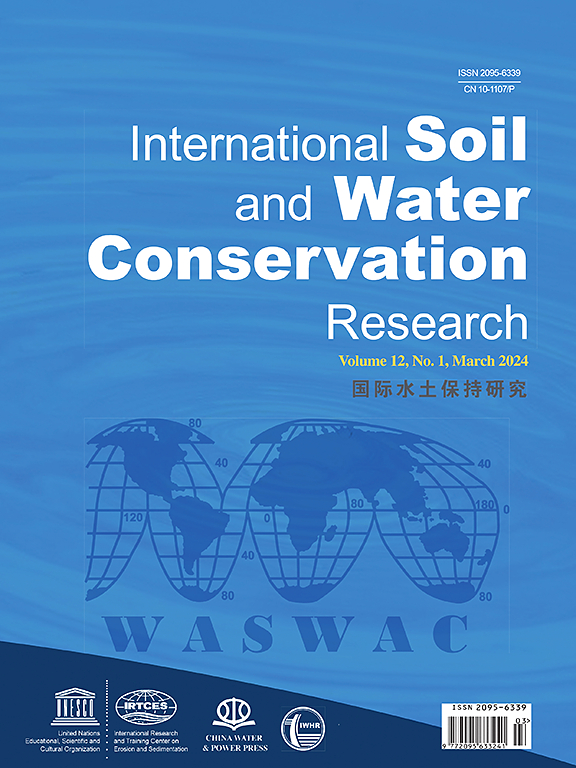欧洲温带大陆性气候区农业适宜性和土地使用兼容性的地理空间评估
IF 7.3
1区 农林科学
Q1 ENVIRONMENTAL SCIENCES
International Soil and Water Conservation Research
Pub Date : 2024-01-13
DOI:10.1016/j.iswcr.2024.01.002
引用次数: 0
摘要
土地适宜性评估与地理信息系统结合使用,可对土壤功能的不同方面进行空间建模,具有促进农业生产可持续增长、减少土地退化或帮助人类适应气候变化的潜力。与现有数据集相比,本研究对欧洲温带大陆性气候下几种作物和土地利用的农用土地适宜性进行了新的更高分辨率的地理空间评估。为了建立土地适宜性模型,我们使用了描述 17 个生态-植物学指标(如土壤质地、pH 值、孔隙度、温度、降水量、坡度)的地理空间数据。为了评估土地的利用情况,我们将适宜性地图与农作物地图进行了空间交叉对比。在整个研究区域内,小麦和大麦在南部显示出大量适宜土地,马铃薯和甜菜在北部显示出最大的适宜土地范围,而玉米和向日葵显示出的适宜土地范围要小得多。地下水位深度、降水量、温度、地形坡度、土壤孔隙度、SOC 和表土质地成为研究区域农业适宜性的限制因素。我们的研究结果表明,适宜的耕地并没有为扩大作物种植留下空间,但是,我们发现在不适宜的土地上广泛种植小麦和玉米的地区,有可能种植大麦、向日葵、甜菜和马铃薯等更适宜的作物。看来,加强研究地区农业实践的一项措施是将每种种植作物更好地分配到更合适的土地上。本文章由计算机程序翻译,如有差异,请以英文原文为准。
Geospatial evaluation of the agricultural suitability and land use compatibility in Europe's temperate continental climate region
Land suitability assessment is used in conjunction with geographic information systems to spatially model diverse aspects of soil functions, having the potential to facilitate a sustainable increase in agricultural production, reduce land degradation, or aid humans in adapting to climate change. Compared to the existing datasets, this study provides a new higher resolution geospatial assessment of the agricultural land suitability for several crops and land uses in the temperate continental climate across Europe. To model the land suitability we used geospatial data depicting seventeen eco-pedological indicators (e.g. soil texture, pH, porosity, temperature, precipitation, slope). To evaluate how the land is utilized, the suitability maps have been spatially cross-tabulated with a crop map. Over the entire study area, wheat and barley showed significant suitable land in the southern part, potatoes, and sugar beet exhibited the highest extent of suitable land in the northern parts, while corn and sunflower exhibited a much lower extent of suitable land. Water table depth, precipitation, temperature, terrain slope, soil porosity, SOC, and topsoil texture emerged as the limiting factors for agricultural suitability in the study area. Our results show that the suitable arable land does not have space left for the expansion of crops, however, we have identified regions with extensive cultivation of wheat and corn on unsuitable land with the potential for cultivation of more suitable crops such as barley, sunflower, sugar beet, and potato. It seems that one action that can enhance agricultural practices in the study area is to better allocate each cultivated crop across more suitable lands.
求助全文
通过发布文献求助,成功后即可免费获取论文全文。
去求助
来源期刊

International Soil and Water Conservation Research
Agricultural and Biological Sciences-Agronomy and Crop Science
CiteScore
12.00
自引率
3.10%
发文量
171
审稿时长
49 days
期刊介绍:
The International Soil and Water Conservation Research (ISWCR), the official journal of World Association of Soil and Water Conservation (WASWAC) http://www.waswac.org, is a multidisciplinary journal of soil and water conservation research, practice, policy, and perspectives. It aims to disseminate new knowledge and promote the practice of soil and water conservation.
The scope of International Soil and Water Conservation Research includes research, strategies, and technologies for prediction, prevention, and protection of soil and water resources. It deals with identification, characterization, and modeling; dynamic monitoring and evaluation; assessment and management of conservation practice and creation and implementation of quality standards.
Examples of appropriate topical areas include (but are not limited to):
• Conservation models, tools, and technologies
• Conservation agricultural
• Soil health resources, indicators, assessment, and management
• Land degradation
• Sustainable development
• Soil erosion and its control
• Soil erosion processes
• Water resources assessment and management
• Watershed management
• Soil erosion models
• Literature review on topics related soil and water conservation research
 求助内容:
求助内容: 应助结果提醒方式:
应助结果提醒方式:


